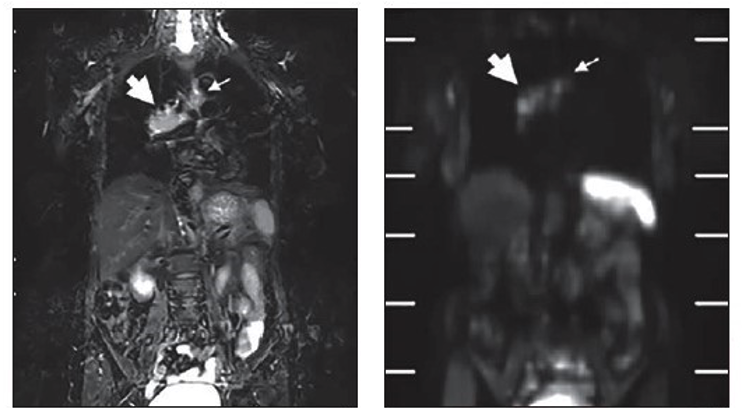MRI Improves Staging of Patients with Small Cell Lung Cancer
 A study published in the American Journal of Roentgenology (AJR) reports that MRI, with or without FDG PET co-registration, improves the staging of patients with small cell lung cancer (SCLC) compared to conventional staging tests.
A study published in the American Journal of Roentgenology (AJR) reports that MRI, with or without FDG PET co-registration, improves the staging of patients with small cell lung cancer (SCLC) compared to conventional staging tests.
“FDG PET/CT, whole-body MRI, and co-registered FDG PET/MRI outperformed conventional tests for various staging endpoints in patients with SCLC,” concluded first author Yoshiharu Ohno from the Fujita Health University School of Medicine in Japan. Whole-body MRI and FDG PET/MRI outperformed FDG PET/CT for T category and thus TNM stage, “indicating utility of MRI for assessing extent of local invasion in SCLC.”
Ohno and colleagues’ prospective study included 98 patients (64 men, 34 women; median age, 74 years) with SCLC who underwent conventional staging tests (brain MRI; neck, chest, and abdominopelvic CT; bone scintigraphy), FDG PET/CT, and FDG PET/MRI within 2 weeks before treatment. After MRI technologists performed co-registration via proprietary software (Canon Medical Systems), two nuclear medicine physicians and two chest radiologists independently reviewed the examinations in separate sessions.
In patients with SCLC, accuracy for T category was higher (p<.05) for whole-body MRI (94.9%) and FDG PET/MRI (94.9%) than for FDG PET/CT (85.7%). Meanwhile, TNM stage accuracy was higher (p<.05) for whole-body MRI (88.8%) and FDG PET/MRI (86.7%) than for FDG PET/CT (77.6%) and conventional staging tests (72.4%).
“These additional observations may relate to a superior role of MRI in assessing the extent of local soft tissue invasion by tumor, as has been observed in settings other than SCLC,” the authors said.